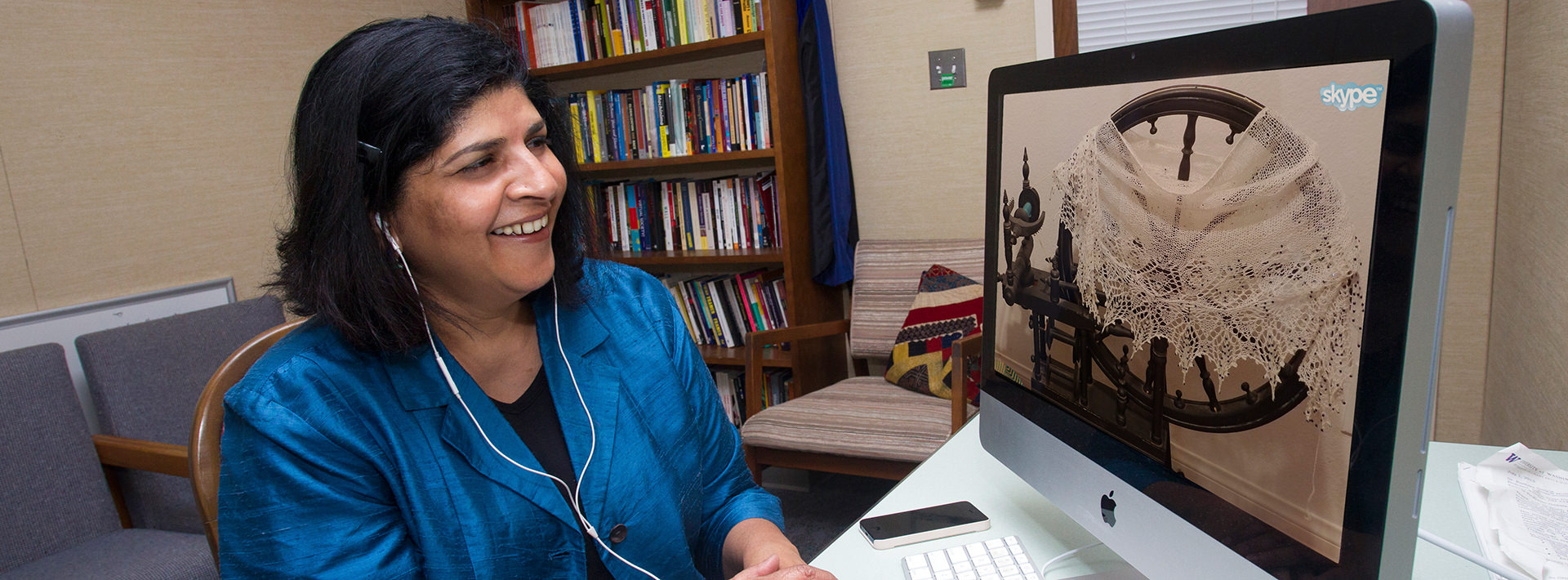Internet weaves North and South
Fulbright Scholar post to add new dimension to Gajjala’s research, teaching

Dr. Radhika Gajjala will be leaving the School of Media and Communication in July for a year in Norway as a Fulbright visiting professor at the University of Bergen.
Gajjala’s longtime teaching and research interests are a good fit with Bergen’s Department of Linguistic, Literary and Aesthetic Studies and its Digital Culture Program and research group, she said. During her Faculty Improvement Leave year, she will spend about half her time teaching and the other half expanding her research on global media and digital cultures.
In collaboration with Bergen faculty, she will teach a section on “Postcolonial Perspectives on Science and Technology” in a course analyzing the relationship between technology and society. She will also teach courses on gender and gaming and on global media.
“You could add ‘and the Internet’ to all the topics I’m interested in,” Gajjala said. Those include information technology and postcolonial science studies, global media and game studies.
Gajjala’s current research deals with two interrelated issues.
One involves examining how South Asians living in diaspora use various kinds of technologies in their everyday lives to connect socially and financially to their home nations. She plans to connect with immigrant and host communities in Norway, Germany, the U.K., Finland, Sweden and Denmark in order to examine their use of mobile technologies, social media and gaming environments.
The Fulbright post will allow Gajjala to work with members of the Digital Cultures Research group and the Center for Women’s and Gender Research and to connect with the Bergen South Asia Forum at the University of Bergen. Her travel will also provide her the opportunity to collaborate with colleagues in other parts of Europe and in the U.K.
Gajjala’s second research interest involves looking at online do-it-yourself (DIY) craft communities who take part in “geeking and crafting” using digital media to connect with each other, create emotional links and exchange knowledge. This has been a major focus of hers the last few years.
“It’s juxtaposing old and new technologies,” she observed, noting that the traditional jacquard loom is “coded” much like a computer. Her research has previously taken her to India and areas in Southeast Asia to interview spinners and hand loom weavers in particular, an art she has thoroughly embraced herself for the past 10 years. She thus sees herself both as a researcher and a participant, she said.
“Internet community formation around fiber crafting tends to be dominated by women, but it is by no means only that,” Gajjala said. “Even though fiber/handcrafting is often done through home space while connecting to public space via the Internet, it is not a return to domesticity” — as a recent, controversial opinion piece in the New York Times suggested. “These are people who are crafting for creative reasons—it’s not like mending or darning,” she said.
“I’m turning my research upside down with this Fulbright,” she said. Instead of interviewing practitioners in the global South as she has been doing, she will be able to talk with DIY crafters in northern Europe, including immigrants who use technology to maintain connections to home.
She is excited about the opportunity to expand her research for the hand crafters project, “Tangled Yarn and Tangled Wires: Critical Interventions in Methods for Digital Humanities Research.”
“I’ve got one year to gather this data,” Gajjala said. “I think new connections will be revealed, and will eventually reveal the fuller picture of the role of digital humanities in the postcolonial global society and culture.
“And I want to find the methodology for connecting the seemingly disparate parts in relation to digital humanities.”
The Fulbright Program implements the late Sen. William Fulbright's visionary concept of promoting mutual understanding between the people of the United States and the people of other countries through academic and bicultural exchange. More than 150 countries currently participate in the Fulbright Program.
Updated: 12/02/2017 12:47AM
